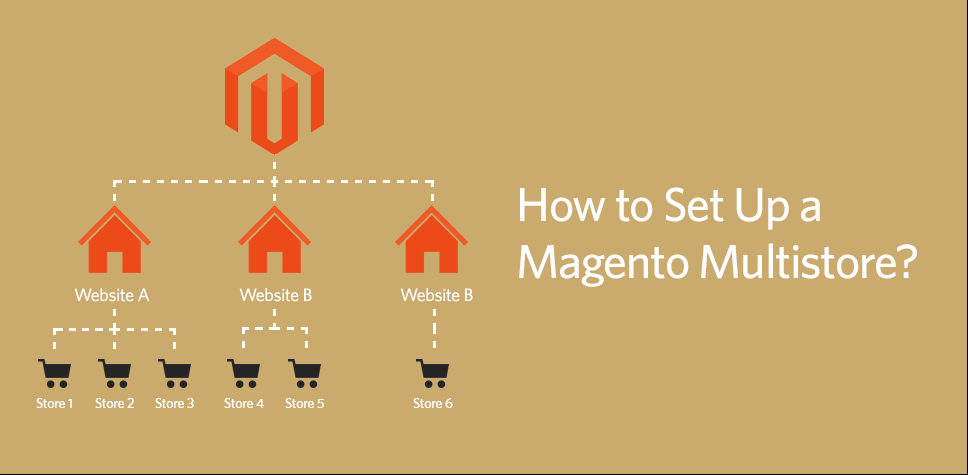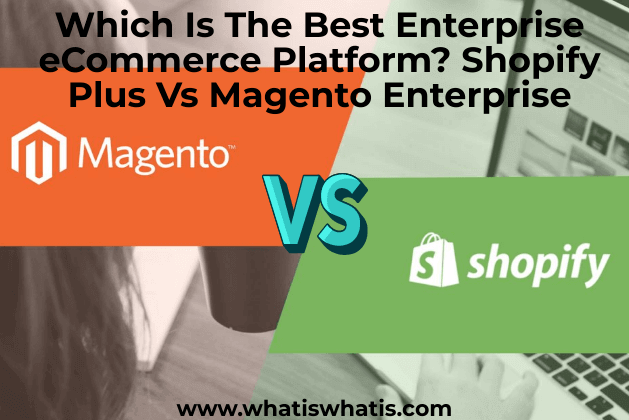Every business has its way of functioning, whether it is the product that they sell or the company culture. With time, as your online business expands, you will be faced with deciding to shift from underlying eCommerce platform to a more suited expanding enterprise. However, there are only a handful of eCommerce platform alternatives at the enterprise levels. The majority of times, brands are left with only two options: Shopify Plus or Magento Enterprise.
It’s never easy to select one out of these two, and the ultimate onus falls on answering one simple question: Which eCommerce platform will be the best for expanding your online business? Magento development services have been quite popular amongst the developer community, and we are seeing a lot of demand for Magento developers.
Read more: 7 Reasons to Have a Mobile App for Your Ecommerce Store
As far as smaller brands and startups are concerned, it is much easier to select an eCommerce platform. The reason being, smaller brands are known to have a smaller customer base with restricted customer interactions, miniature product catalogues, smaller marketing, and merchandising budgets. They also require less need for customisation and put less focus on branding.
In terms of enterprise-level, you need an eCommerce platform that helps in providing some level of control and management. This is not restricted to only an eCommerce website.
The eCommerce platform selected should function much more than simply a virtual storefront. It is an integrated system for:
- Controlling & launching promotions;
- Creating workflows;
- Extension customisation of functionality;
- Managing orders;
- Personalising customer experiences;
- Scrutinising store health and performance;
- Selling products to customers.
We are seeing an increase in the popularity of Shopify Plus and Magento Enterprise on a daily basis. And there is a reason for that. Both the platforms have the desired features that enterprise retailers are looking for.
In the forthcoming sections of this write-up, we have dug deep into these two eCommerce platforms and have provided the significant differences between the two. We promise after reading this piece of content; you will be able to take a wise decision when it comes to opting for the best enterprise eCommerce platform for your online business.
Read more: Web Vs App: Which Is The Best Option For E-Commerce Business?
Launch Date
Magento is one of the popular eCommerce platforms amongst the developer community, thanks to its valuable contribution towards innovative ideas. It was launched in the year 2009. Today, Magento Enterprise boosts of a professional-client base of globally recognised brands like Ford, Olympus, and Coca Cola (to name a few).
Magento is now Adobe Commerce
Adobe has announced that they are acquiring Magento eCommerce platform from eBay. This acquisition means that Magento will become the leading open-source eCommerce platform. Magento is used by over 500,000 merchants worldwide and is considered to be the best eCommerce solution for small businesses.
The Magento community is excited about this news, as they believe that Magento is the best eCommerce platform for small businesses. They have been working hard to improve their product and make it better than ever before. With the addition of Adobe’s expertise, Magento will continue to evolve into a powerful and robust eCommerce platform.
Whereas, Shopify Plus got released officially in the year 2014. Hence, Shopify Plus is still in an infancy stage in comparison to Magento. However, one thing that is in its favour is the fact that it is straightforward to navigate. One thing that goes in favour of Shopify Plus is the fact that it provides fully-supported cloud service. However, at present, it holds less market share than Magento.
Multi-Store Management

Shopify Plus does not provide management of different stores from a single interface. On the other hand, Magento Enterprise delivers the functionality of a multi-store option. This is the biggest USP of Magento Enterprise as it enables merchants to manage various brands and B2B & B2C stores from a single Magento interface. In other words, with the help of Magento Enterprise, you can maintain a wide array of websites that are employing different domain names and/or languages.
Hosting Systems & User-Friendly Customisation
Everyone knows that Shopify Plus is a fully hosted solution. However, do you know what that means? Let’s try to find that out for you. It means that Shopify Plus runs on the server of someone else that manages the layouts of your website. This is good news for eCommerce store owners. The reason being, it is very user-friendly, and you have only a single web interface.
On top of that, you are not required to write endless lines of codes. And if you are concerned about updates, there is some good news for you as it has an external server that automatically takes care of that for you. However, it also means that you do not have access to the code running on your site. This makes it less flexible when it comes to customisation.
Whereas, when it comes to Magento, it is a self-hosted platform. It requires a robust server to handle the vast resources of Magento, which can lead to an addition to operating costs. You can effortless modify it as per your requirement which is its most significant advantage. Since you own the code, it is possible to change everything and anything. You can play the game on your terms.
Pricing
When it comes to comparing Shopify Plus with Magento Enterprise, there is only one winner: Shopify Plus. Let’s find out the reason for that.
Shopify Plus comes at a fixed price of $2,000 every month. It encompasses licenses and support costs. It is an advantage to avail Shopify Plus with a wide array of features at such a reasonable price. Most of the eCommerce platforms have additional charges that are contingent on the particular requirements of the customers and customisation needs.
On the other hand, Magento Commerce Cloud licencing starts from $2,000 monthly. Alternatively, the on-premise commences at $20,000 every year. This cost is dependent on the exclusive merchant turnover (tier-based). So, at the end of the day, you are not paying the same price as a large corporate giant. In the case of “on-premise”, the licensing does not integrate hosting costs which are contingent on the website size.
Concluding Thoughts:
These are some of the differences between Shopify Plus or Magento Enterprise. The question still is, which one of these two is the best enterprise eCommerce platform? Finally, let’s spill the beans and give you the answer to this question. In case, you are not looking for a multi-store configuration, B2B functionality, advanced integration, or multiple currency checkout, Shopify Plus is the right eCommerce platform for you.
On the other hand, if you are looking for a more sophisticated, customised, and integrated solution and have necessary funds to spend then Magento Commerce is the right choice as an enterprise eCommerce platform.
And there is a reason for that. It comes with richer core functionality when compared to Shopify Plus. The ultimate choice boils down between flexibility or simplicity for your online business. If you opt for a more flexible and customisable platform, it will be more complicated.
If you wish to take advantage of Magento Enterprise platform, we suggest you to affiliate with a reputed Magento development company and make your organisation reach new heights of success!






Leave a comment